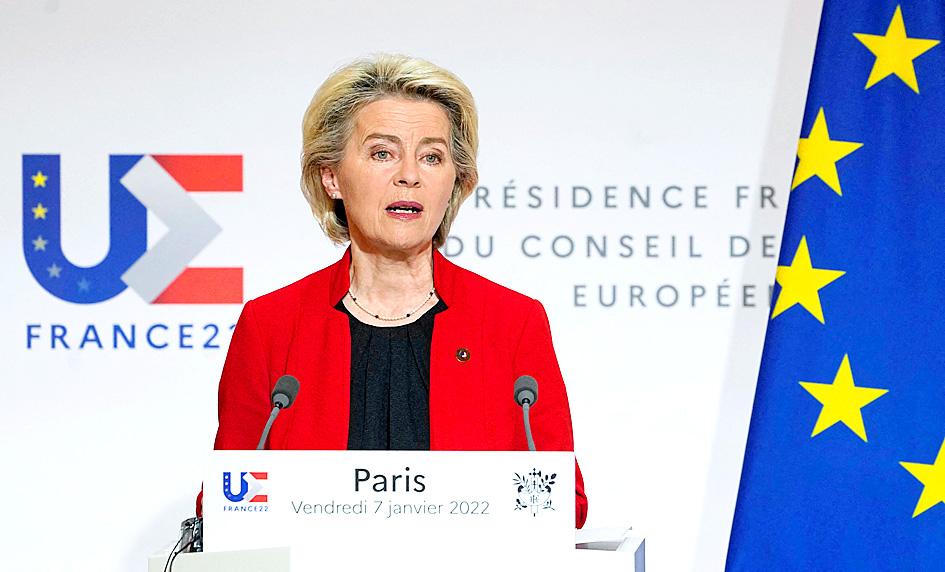The EU is to publish early next month proposed legislation to make the continent a leader in chip production, European Commission President Ursula von der Leyen announced yesterday.
The European Chips Act would further adapt state aid rules “under a set of strict conditions,” the head of the EU’s executive arm said during a virtual address at the World Economic Forum.
“This will allow public support — for the very first time — for European ‘first of a kind’ production facilities so that benefit all of Europe,” she said.

Photo: Reuters
The EU wants to become more involved in chip production, with a target of producing 20 percent of global semiconductor value by 2030, up from 10 percent.
Currently, the EU is a world leader on chip research and production equipment, but lags behind in producing chips, particularly state-of-the-art versions. A global supply shortage of semiconductors highlighted the continent’s dependence on Asia and the US.
Most of the continent’s chips supplies come from outside the bloc, Von der Leyen said, adding: “This is a dependency and uncertainty we simply cannot afford.”
Major semiconductor producers are eying European expansion plans, with Taiwan Semiconductor Manufacturing Co (台積電) exploring a location in Germany and US company Intel Corp due to announce a number of investments in Germany, France and Italy.
In an interview with Bloomberg News editor-in-chief John Micklethwait at The Year Ahead conference on Wednesday, Intel CEO Pat Gelsinger urged the US and Europe to push ahead with efforts to bring back chip manufacturing.
“Let’s not waste this crisis,” he said. “It’s good economics, but it’s also national security.”
Last month, executives from more than 50 US companies called on US congressional leaders to pass legislation that provides US$52 billion in grants and incentives for domestic chip production, as well as a separate bill to encourage semiconductor design and manufacturing.
However, the legislation has been slow to move forward.
The funding plan, called the CHIPS Act, was included in a large package of legislation aimed at countering China that was passed by the US Senate in June last year.
It later stalled in the US House of Representatives.

In Italy’s storied gold-making hubs, jewelers are reworking their designs to trim gold content as they race to blunt the effect of record prices and appeal to shoppers watching their budgets. Gold prices hit a record high on Thursday, surging near US$5,600 an ounce, more than double a year ago as geopolitical concerns and jitters over trade pushed investors toward the safe-haven asset. The rally is putting undue pressure on small artisans as they face mounting demands from customers, including international brands, to produce cheaper items, from signature pieces to wedding rings, according to interviews with four independent jewelers in Italy’s main

Macronix International Co (旺宏), the world’s biggest NOR flash memory supplier, yesterday said it would spend NT$22 billion (US$699.1 million) on capacity expansion this year to increase its production of mid-to-low-density memory chips as the world’s major memorychip suppliers are phasing out the market. The company said its planned capital expenditures are about 11 times higher than the NT$1.8 billion it spent on new facilities and equipment last year. A majority of this year’s outlay would be allocated to step up capacity of multi-level cell (MLC) NAND flash memory chips, which are used in embedded multimedia cards (eMMC), a managed

Japanese Prime Minister Sanae Takaichi has talked up the benefits of a weaker yen in a campaign speech, adopting a tone at odds with her finance ministry, which has refused to rule out any options to counter excessive foreign exchange volatility. Takaichi later softened her stance, saying she did not have a preference for the yen’s direction. “People say the weak yen is bad right now, but for export industries, it’s a major opportunity,” Takaichi said on Saturday at a rally for Liberal Democratic Party candidate Daishiro Yamagiwa in Kanagawa Prefecture ahead of a snap election on Sunday. “Whether it’s selling food or

In the wake of strong global demand for AI applications, Taiwan’s export-oriented economy accelerated with the composite index of economic indicators flashing the first “red” light in December for one year, indicating the economy is in booming mode, the National Development Council (NDC) said yesterday. Moreover, the index of leading indicators, which gauges the potential state of the economy over the next six months, also moved higher in December amid growing optimism over the outlook, the NDC said. In December, the index of economic indicators rose one point from a month earlier to 38, at the lower end of the “red” light.